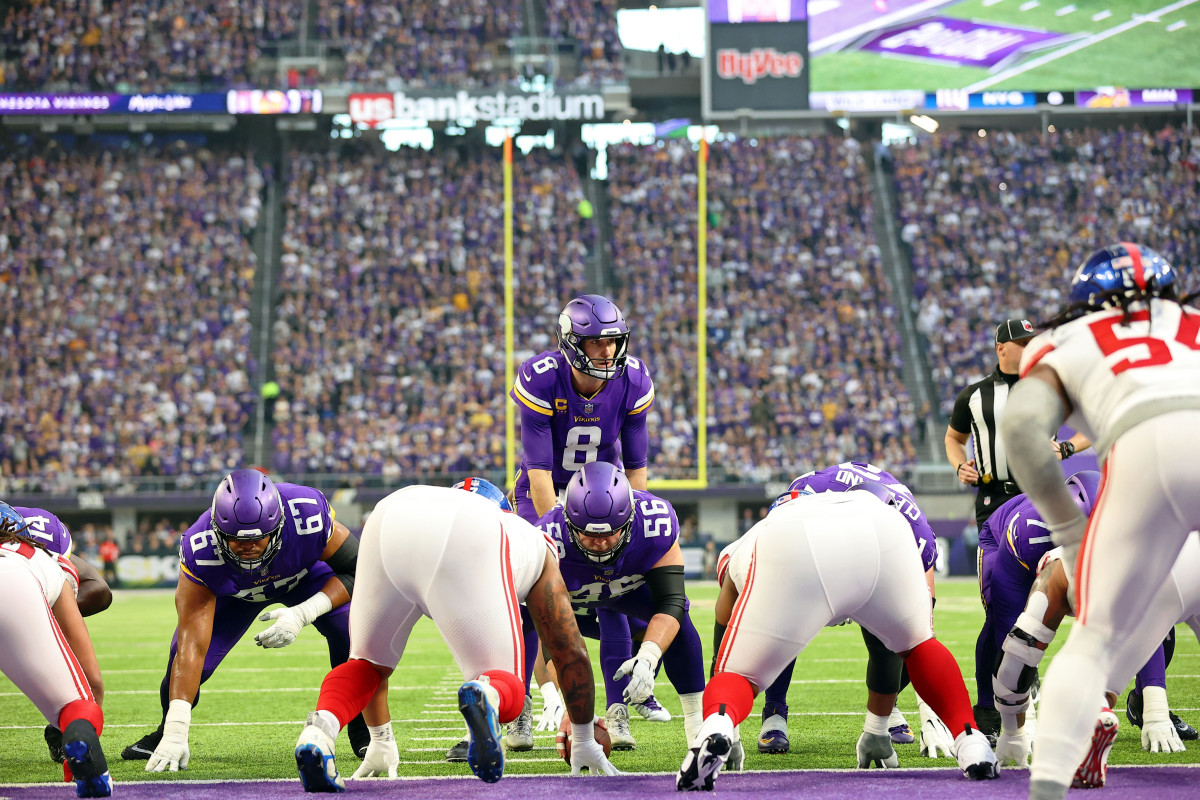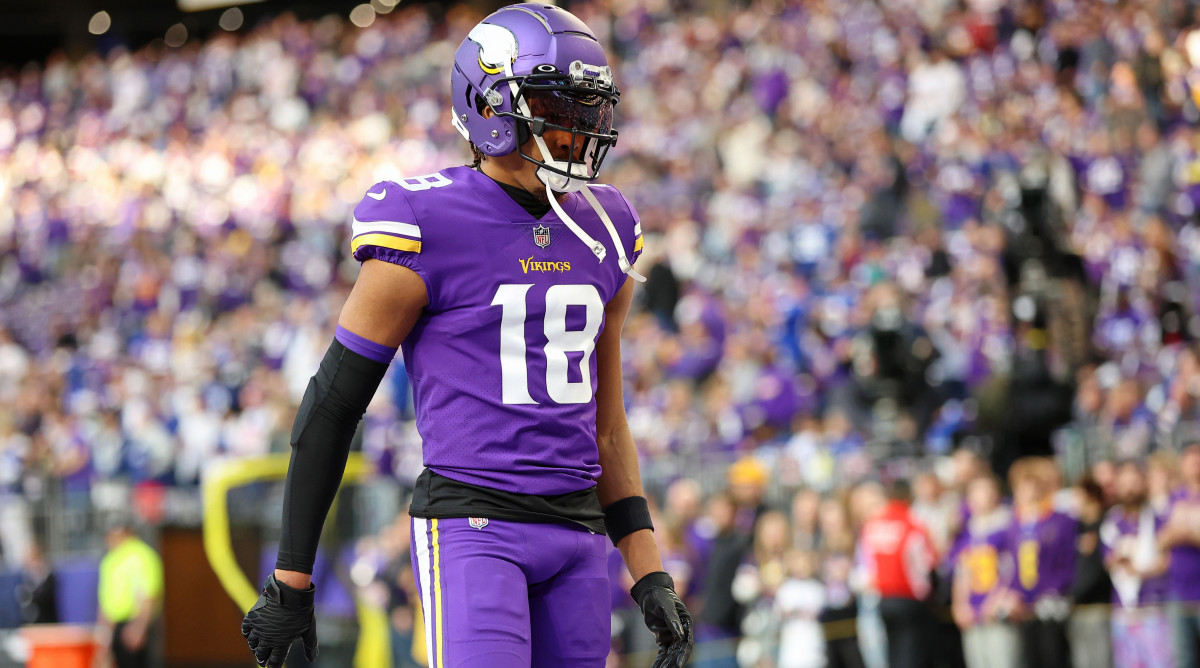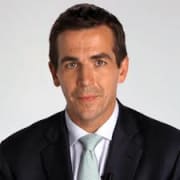How the Vikings Are Turning the Corner After a Comeback Season

To Kevin O’Connell’s left, out a window and over a set of practice fields, there is a set of apartment complexes. One is done, and some of the coach’s younger Vikings colleagues live in it. Another is visible but not done, with the siding still not up and plenty of finishes left to be completed. All of it is part of the vision O’Connell’s bosses, the Wilfs (real-estate developers by trade), have for building around the team’s palatial headquarters.
The race the Wilfs are running in building up the land parallels the one their football coach and the GM he was hired with, Kwesi Adofo-Mensah, are leading the team on.
Last year, for the new Vikings brass, was about laying down the foundation, which would serve as the centerpiece for O’Connell and Adofo-Mensah’s burgeoning program. Now the challenge is to maintain that foundation while also building up everything else around it. Which means some goals (like winning) remain the same, while the pursuit of others looks different.
Gone now are long-term Vikings cornerstones Adam Thielen and Eric Kendricks. Harrison Smith is back on a reduced contract. Dalvin Cook’s status is still up in the air, as he and the team have tried to find a financial middle ground. And none of that, O’Connell emphasizes while leaning back in his office chair, takes anything away from what those players gave him and his staff, or Adofo-Mensah and his crew, during a 13–4 debut season for the coach and GM.
“The respect factor, the relationships I built with those players, they were all real,” O’Connell says. “They were all valued tremendously by me. And I hope it was the same for those players, in knowing that 2022, for us, was my first year, and I leaned on those guys. I hope they look back [fondly on it]. And it didn’t end the way we wanted it to, but there was a lot of real positive that they had a direct hand in. And as we move forward here, that won’t change. That’s the foundation we’re building upon, that they were absolutely a part of it.”
So why not, after such a successful maiden voyage, run it back?
To me, the answer brings you to one of the NFL’s most interesting, and often overlooked, team-building stories of the 2023 offseason. Because as certain pieces are coming out, others are being built up, like all that land around the team facility, piece by piece. And so much of it reflects the vision the Wilfs bought into by hiring O’Connell and Adofo-Mensah, and the background both men brought with them to the Twin Cities.
In the MMQB Lead for this Memorial Day Monday, we’ll take you inside all of that.
Given the holiday weekend, we’re pushing my takeaways to Tuesday morning. Come back then for …
• A deeper look into how Roger Goodell’s lobbying changed the kickoff rule.
• What Patrick Mahomes’s contract adjustment could look like.
• When the next steps in the Commanders’ sale process will come.
But we’re starting a parking lot away from where last week’s meeting was held, in the Vikings’ facility, where change is afoot even after a turnaround season in 2022.
The circumstance the Vikings found themselves in after the Giants ended their season in the wild-card round wasn’t an unforeseen one. Because of how contracts were structured before their arrival, O’Connell and Adofo-Mensah were looking at having eight players with eight-figure cap numbers for 2023, with those eight adding up to $147.85 million (66% of the cap). Five of those numbers jumped by $8 million or more from ’22, and the top four chewed up almost $100 million ($95.122 million, or 42% of the cap, to be exact).
And, yes, they could’ve addressed that with a teardown in 2022.
They chose not to, and that was purposeful, too. Like the Bills of 2017 or the Falcons of ’21, O’Connell and Adofo-Mensah felt like the right course was to establishing a winning foundation with the existing core before clearing the decks financially to set themselves up for the future—in part because both loved the culture that had been established in the locker room already, through the Rick Spielman and Mike Zimmer regime.

“Those guys had earned respect for a reason,” O’Connell says. “As a young first-time head coach, I wanted to not only engage with them; I wanted to learn from them. I wanted to allow them to have their fingerprints on our team, based upon their experiences and how we put together something we could be really proud of, and do it in Year 1. And in my mind, there really wasn’t a real necessity to say goodbye to a lot of those guys immediately.
“It was hopefully as much to their benefit as it was to ours, that they get to have another great year, experience some success, continue to grow in their own right, even at that point in time in their career, and get to look back at that year and feel like they had a real hand in it. Because they really did.”
So, yeah, it’s fair to say gambling on what they inherited was a good bet. It wasn’t just that the Vikings were 13–4. They also went 11–0 in one-possession games, bounced back from their worst loss of the season by beating the Patriots on a Thursday night and avoided consecutive losses on their way to winning the NFC North for the first time in five years. All of which showed the character of a group everyone knew would have to be reworked.
It’s also why, after Minnesota took the 31–24 loss to the Giants in the playoffs, O’Connell and Adofo-Mensah wanted to be intentional about the way they handled the exit meetings.
The coach did his best to meet with every last player on the roster—a few slipped through the cracks because of logistical conflicts—and be honest about what their future with the team might be. For some, those talks would be about going into 2023 full steam ahead. For others, they’d serve as a precursor to tough discussions that loomed on their contracts. For a few, there might have been a more stark reality to confront.
“We met with everybody and just tried to have a forward mindset with the conversation but always in treating each individual one as their own and making sure those guys heard it directly from me, in this office, on how much I respected them as people, players, leaders,” O’Connell says. “And [they were told] as we move forward here, it’s not gonna be lost on me how each individual situation is dealt with.”
That meant even in the toughest situations, where follow-up conversations weeks later meant saying goodbye, there was an olive branch extended and an appreciation for what each player had done for the team.
“When those things were final, those decisions were made, I reached out directly to those guys and made sure, once again, they heard it from me,” O’Connell continues. “But also, Hey, moving forward, if there’s anything I can do or I can help with in any way, I was gonna do that. I was excited to see Eric [Kendricks] go to a place like the Chargers with somebody who’s one of my closest friends in football. And Brandon [Staley] knows exactly what he’s getting in Eric from the standpoint of a leader, a culture-changing type player like that.
“And same with Adam [Thielen]. I talked to Adam multiple times about some of the opportunities he had and ultimately just wanted to be a resource for him—as much as anything just as a friend, and somebody that respects him.”
And with that, the page would be turned.
Of course, the financial part of the Vikings’ reset shouldn’t be lost in a mess of transactions.
Minnesota is, indeed, carrying more than $30 million in dead money this year, and that number could still climb. So yes, simple math is a big part of all this.
But it’s not the only part. If you dig into Adofo-Mensah’s roots with the 49ers and O’Connell’s history winning a Super Bowl with the Rams, you’ll see trend lines that guide you not just in how much should be spent, but in where it should be spent.
The Rams invested heavily into premium players at premium positions such as Matthew Stafford, Andrew Whitworth, Cooper Kupp, Aaron Donald and Jalen Ramsey. And if Los Angeles was going to take extra swings, it was going to be with impact guys like Odell Beckham Jr. and Leonard Floyd—the idea being the Rams could find guards and safeties and off-ball linebackers in the draft, even after trading away high picks to build up the core.
Similarly, the Niners focused their building on players who were force multipliers, those that would allow you to get away with a little less at another spot. Having Nick Bosa, DeForest Buckner and Arik Armstead up front, for example, allowed San Francisco to be more economical in the secondary; having Trent Williams at left tackle allowed some corner-cutting on the line; and having George Kittle and Deebo Samuel made the QB better.
Along those lines, the Vikings wanted to be more nimble with massive contracts coming for players who fit into that category (such as Justin Jefferson and Christian Darrisaw) and also create flexibility to onboard more of those types, if opportunities like the Rams were presented with Stafford and Ramsey materialize.

Of course, that also means having the sort of environment that can absorb those sorts of shifts, which goes back to why building it last year was so important and maintaining it now is equally so.
That wasn’t going to get easier with the departures of longtime leaders. But therein was the other benefit of retaining the existing core for another year: Younger players on the team got, in some cases, the extra year to develop, and, in all cases, the chance to watch guys like Kendricks and Thielen lead one last time before the baton was passed.
As a result, O’Connell sees a group of younger players now more ready to take that baton.
Some of the Vikings’ leadership won’t flip. Kirk Cousins is still around. Smith, Jordan Hicks, Brian O’Neill, and C.J. Ham are, too. And those are the people who have helped cultivate the future captains behind them.
O’Neill has, perhaps, the best story on that count. Last year, when the right tackle was hurt in Week 17, O’Neill went to O’Connell to suggest the coach add another captain to replace him, suggesting that then third-year safety Josh Metellus be the one. O’Connell agreed and took it to the team for a vote, which ended up being “pretty unanimous,” according to O’Connell.
The hope is, with another year under their belts, guys like Jefferson, Darrisaw, Alexander Mattison and Garrett Bradbury will take another step in that department, too, with the coaches challenging the players they feel are ready to do so.
“It’s like, Hey, I think you’ve earned the right. Your performance and production is one thing, but now you’re filling a void of some players that aren’t here anymore, that were here since you’ve been here. And you’ve become the player you’ve become, maybe because of the exposure to those guys,” O’Connell says. “Now it’s, Can you take your own personal leadership to the next level and help guide this team? And, time and time again, in those conversations, it’s something that those players are excited about.”
The coach is seeing it manifest already, with the team a month into its offseason program and starting full OTAs, both with the aforementioned names and even with second-year players like Brian Asamoah II and Lewis Cine, who project as future leaders on defense.
“Kirk has been great this spring, too,” O’Connell says. “A guy like T.J. Hockenson is another I’d mention, although he was only here for 10 games, his productivity was one thing, but how he fit with our group, and then where he’s gone, bringing that tight end group along. I think what you’re seeing now in the spring, in skill development, and the teaching-and-learning phase of the year, what it really ends up being is a lot in their individual rooms. And then Kirk on the offensive side. with those skill guys, in meetings, his ownership of the offense.
“I would just say it’s an all-encompassing thing, of where I hope it gets to. As this thing continues to grow towards the competition phase in training camp, and then on into the season, as those rooms grow, and ultimately those sides of the ball grow.”
Of course, there’s on-field production that’ll have to be replaced, too. The Vikings are going to be younger on the back end of the defense, both at linebacker and in the secondary. And that means the training wheels will come off with players like Asamoah at linebacker, Cine at safety, Andrew Booth Jr. at corner, and even in how K.J. Osborn and rookie Jordan Addison take the heat off of Jefferson at receiver.
Going that way is obviously designed to help the Vikings in the long run.
But because, out of all those names, only Addison is new, the idea is also that those players will be ready now, certainly more so than they would’ve been last year, to mitigate the short-term hit the team takes for throwing them into the fire. And if it works, then the vision O’Connell and Adofo-Mensah set out will really get rolling.
That’s really just it. Much like when captains Tyrod Taylor and Kyle Williams left the Bills (and the Buffalo staff had Micah Hyde and Jordan Poyer there to bridge to burgeoning young leaders like Josh Allen and Tre’Davious White), the Vikings brass is confident that the legs of the leadership relay they’ve assembled are all strong enough, and collaborative enough, to build off a smashing 2022 debut.
That doesn’t mean Minnesota will be unbeaten in one-score games again, nor does it mean they’ll avoid consecutive losses for the second straight year. But it should give them a shot at clearing the bar that was set in the program’s first year, and at performing in the biggest spots the same way they did last year.
And to illustrate why O’Connell is confident—sans Kendricks and Thielen, among others—that the aforementioned baton has been passed cleanly, and not dropped, the coach went back to the story of Metellus becoming a captain in January.
“Stuff like that, that you organically do, you make this thing feel real and you make the players feel [like it theirs],” said O’Connell. “And it’s the reality. The player ownership is huge.”
It is now, in May, as O’Connell tries to get all those things going on the practice fields outside that office window. And if the Minnesota staff is right about its roster, and its locker room, it’ll go a long way beyond just that, too.
